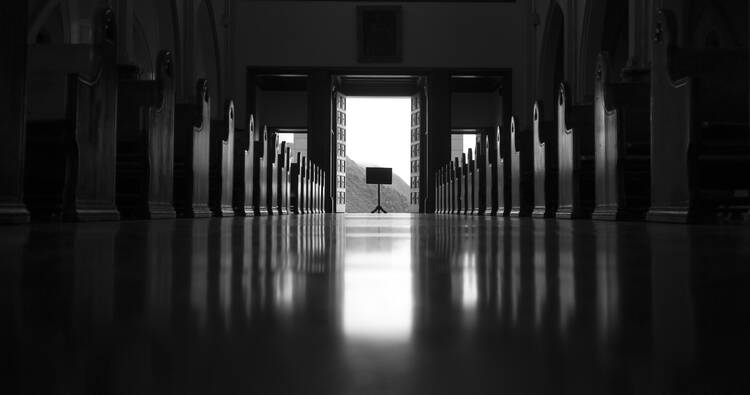In recent years, the church has made great progress opening its doors to people with disabilities. Most churches now have physical ramps that give people with limited mobility access to the spiritual nourishment of the church.
But what about the Catholic faithful who are inhibited from entering the church, not by a physical disability but a sacramental one? When survivors of sexual abuse by members of the clergy encounter the symbols of Christianity through which they were abused, they may experience feelings ranging from severe discomfort to panic attacks. I consider these “sacramental disabilities.” One young girl, for example, was told by the priest who sexually abused her that if she ever told anyone about what he did to her, Jesus would come down from the cross and kill her. One young boy was sexually molested by a priest at the altar. Unless their trauma is addressed, survivors like this young boy and girl might never be able to walk through the doors of the church or participate fully in the sacramental life of the church.
Unless their trauma is addressed, survivors might never be able to walk through the doors of the church.
What might be a charitable response to those suffering from a sacramental disability? Wheelchair ramps help disabled persons enter into a church building. There is a need for spiritual ramps to enable Mother Church to go in the other direction: to come down and seek out those who have been sacramentally disabled, knowing that it is extraordinarily difficult for survivors to speak of their abuse to anyone, let alone ask for sacramental modifications.
The sad reality is that victim-blaming is likely to be the response of some parishioners to survivors of clergy abuse. Learning to speak about very sensitive issues in a caring way requires practice. Some parishes have shown leadership in this regard. The Newman Centre at the University of Toronto offered discussions about the movie “Spotlight” to help parishioners and students process their strong reactions to this movie. St. Anthony’s Shrine in Boston has hosted several meetings for persons wishing to share with others how they have been affected by the clergy sexual abuse scandal.
What might be a charitable response to those suffering from a sacramental disability?
Once a parish community breaks the ice with such an event, offering workshops led by qualified healing professionals specifically on how to respond compassionately to survivors of any form of sexual abuse might minimize the risk of survivors being further traumatized by how members of faith communities respond to them. Similarly, inviting survivors of clergy sexual abuse who wish to assist the church in healing and reconciliation efforts to speak of their experiences provides firsthand knowledge of the sensitivities involved. Identifying caring church members willing to bring the love of Mother Church to survivors of clergy abuse would be a good next step. Once such individuals are identified and trained in communicating with traumatized individuals, perhaps in collaboration with a local sexual assault center and psychologists specializing in healing from trauma, engaging in outreach activities could begin.
Compiling a list of referrals to qualified, competent and survivor-sensitive health professionals, priests, women religious and spiritual directors in a diocese would be very helpful to outreach efforts. Because many survivors of abuse have left their parishes, advertising in local and social media that a parish cares about those wounded in the church, and offers to help them meet their specific needs, is an important work in building a spiritual ramp. Then, a parish might provide a way for a survivor to contact a trained parishioner by telephone or email to be a listening ear, prayer partner, referral provider or supporter who might agree, for example, to meet at the church door and sit with the survivor at Mass.Finally, no matter one’s role in church life, prayers for the healing and reconciliation of clergy abuse survivors with the church constitute the most important nails in the construction of any spiritual ramp.
The media reports of abuse in the church may have overwhelmed and tired the faithful to the point of not wanting to hear any more about clergy sexual abuse. But ignoring the cross does not mean that it is not still there. By embracing this cross, the church has an opportunity to grow into its full maturity as Mother Church to a hurting world.











clergy MISCONDUCT is liken to eating a cookie during lent --- clergy criminal conduct is the type of crime associated with sexual abuse of a child. using the word misconduct minimizes the injuries of victims of clergy criminal conduct
Hello Bob, Thank you for reading my article. I appreciate your concern about minimizing injuries. In fact, that is why I chose to use the term 'abuse' within the article to describe the heinous criminal conduct experienced by people I know, and used the word 'misconduct' to describe my own. My experience within the Catholic Church, while harmful, would not constitute grounds for criminal-level proceedings, so 'misconduct' is the more accurate term in my case.